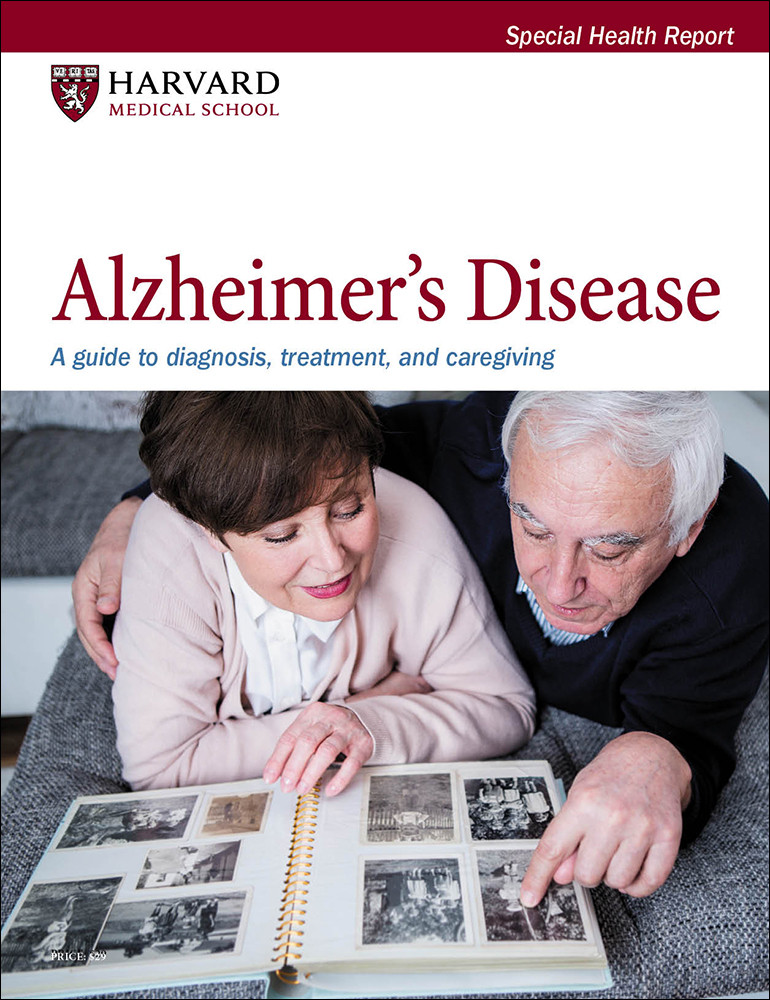How to lower your dementia risk
The three basics of healthy living — exercise, diet, and sleep — are also the best medicine for your brain.
- Reviewed by Howard E. LeWine, MD, Chief Medical Editor, Harvard Health Publishing; Editorial Advisory Board Member, Harvard Health Publishing

An estimated 3% of adults ages 65 and older currently have dementia, and that proportion rises substantially as people age. By age 85, about one-third will be diagnosed with some form.
The diagnosis of dementia is based on a set of symptoms, including memory loss, confusion, changes in personality, a decline in cognitive skills, and inability to perform everyday activities.
But can you do anything to lower your risk?
"The most convincing evidence continues to be for the boring stuff — aerobic exercise, a brain-healthy diet, and quality sleep," says neuroscientist Dr. Daniel Daneshvar, chief of the division of brain injury rehabilitation with Harvard-affiliated Massachusetts General Hospital. "Even people with a family history of dementia could lower the risk by investing more in these basic healthy lifestyle habits." Here's how they help with dementia prevention.
Aerobic exercise. The buildup of beta-amyloid protein in the brain is a key hallmark of many diseases that cause dementia, such as Alzheimer's disease, dementia with Lewy bodies, and frontotemporal dementia. Another common form, vascular dementia, stems from damage to brain cells that occurs when narrowed or hardened blood vessels fail to supply enough blood to the brain.
Aerobic exercise increases blood flow to the brain, supporting blood vessels and decreasing the risk of blood vessel damage. It also helps reduce inflammation, thought to be one of the main causes of abnormal protein buildup.
Aerobic exercise is any activity that increases your heart rate. Although most aerobic exercise requires you to move your entire body, the main focus should be on your heart and lungs. "Activities like walking, running, swimming, cycling, even dancing, if done at sufficient intensity, get you breathing faster and your heart working harder," says Dr. Daneshvar. Guidelines recommend adults do at least 150 to 300 minutes of moderate-intensity aerobic exercise per week.
It's never too late to begin, either. "Even older people who have rarely done aerobic exercise before can still reap the benefits once they start," says Dr. Daneshvar.
Brain-healthy diet. There are several extensively studied diets that promote brain health, like the Mediterranean, DASH (Dietary Approaches to Stop Hypertension), and MIND (Mediterranean-DASH Intervention for Neurodegenerative Delay) diets. "These diets are linked to lower levels of brain-damaging chronic inflammation by reducing or eliminating red meat and processed foods and increasing the intake of antioxidant-rich fruits and vegetables and fatty fish high in omega-3 fatty acids," says Dr. Daneshvar.
Quality sleep. During sleep, the brain clears out harmful beta-amyloid proteins. But the cleaning process can't do a complete job if sleep is regularly disrupted — by insomnia, sleep apnea, or other issues that cause you to wake during the night. "Eventually, this can cause or exacerbate abnormal protein buildup," says Dr. Daneshvar.
If you regularly don't feel rested upon waking or have trouble falling and staying asleep, speak with your doctor. It's important to address any sleep disorder or other health issues that interfere with sleep, like acid reflux. Taking multiple medicines, depression, and changes in the bedroom environment (for instance, in temperature, noise level, smartphone usage, or light exposure) also can disrupt sleep.
Engage your brain by socializingAnother way to protect your brain from dementia is to socialize more. A study published online Oct. 24, 2023, by JAMA Neurology found that socially isolated older adults have a 27% higher chance of developing dementia than older adults who aren't isolated. "Regular interactions activate mental processes, including attention and memory, which can bolster cognition," says neuroscientist Dr. Daniel Daneshvar with Massachusetts General Hospital. Here are some ways to increase your social engagement: Get into group dynamics.Join a group activity, such as a walking club, a golf or bowling league, a book or chess club, or a continuing education class at an adult education center. Schedule friend time.If you have a circle of friends but you don't see them regularly, take the initiative and schedule routine get-togethers. Designate a day, time, and place for coffee, lunch, or any type of gathering designed for easy conversation. Group video chats also are an option. Engage in "weak ties." Casual interactions, known as "weak ties," also can provide stimulating engagement. For example, strike up a brief conversation with a stranger or employee at the grocery store or coffee shop. Even social media conversations and texting qualify. |
Image: © Pekic/Getty Images
About the Author

Matthew Solan, Former Executive Editor, Harvard Men's Health Watch
About the Reviewer

Howard E. LeWine, MD, Chief Medical Editor, Harvard Health Publishing; Editorial Advisory Board Member, Harvard Health Publishing
Disclaimer:
As a service to our readers, Harvard Health Publishing provides access to our library of archived content. Please note the date of last review or update on all articles.
No content on this site, regardless of date, should ever be used as a substitute for direct medical advice from your doctor or other qualified clinician.
















